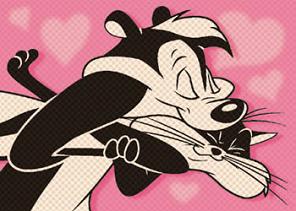 Why is it so difficult to create a decent romantic comedy?
Why is it so difficult to create a decent romantic comedy?The key word here is decent, not great. The genre by its very definition doesn't demand any attempts at greatness--audiences want palatable fare, a few yuks, some suspense, and a little enlightenment about the thorny world of love. The genre isn't designed to change anyone's life, or even their relationship. A happy ending is guaranteed after all.
And yet Hollywood, despite its preoccupation with the genre and its prospects of ticket sales, continues to not even hit the mark of decent, falling usually to mediocrity or worse. Did anyone see License to Wed for God's sake?
A.O. Scott recently dissected romantic comedies in the New York Times, noting their predictable formula: "A single woman, courted by two eligible men, will be drawn toward the man who is superficially right but ontologically wrong for her before choosing, in the final 20 minutes, the man with the opposite qualities. Or, more rarely, a single man will face the analogous predicament. Or an incurable skirt chaser will be cured, usually by a lady who at first had seemed to be repelled by his irresistible manly charms. Or a couple on the verge of splitting — or already split — will discover that they were meant to be together after all."
Predictability, however, shouldn't be such a problem. It's all in the execution. As with any work of art, the vision of the thing matters more than its form. There's no reason that romantic comedies have to be "movies whose notion of love is insipid, shallow and frequently ludicrous," as A.O. Scott puts it.
Without going into details about romantic comedies my overall impression of the last decades fare is summed up by a kind of bland slapstick where no one gets hurt, no one really falls in love, and no one really laughs. It's like going to a dinner party where everyone is trying to be polite, and no one dares a joke at another's expense.
One of the answers that A.O. Scott posits for the romantic comedy's demise is an aversion to love's invigorating fisticuffs. The old romantic comedies (e.g., Grant and Hepburn) were notable for the "emotional combat of two strong-willed, independent individuals ending in mutual conquest. Love, in those old pictures, was a dangerous and noble sport that required skill and cunning as well as commitment. It required movie stars whose physical appeal was matched by verbal dexterity and a vital sense of idiosyncrasy."
A friend noted that so often in romantic comedies, the female character is portrayed as a cold, disciplined woman in a power position--out of touch with her emotions, a bit crazy without knowing it (hence comedic), and scarcely maternal or nurturing. Then the man enters the picture, and essentially brings her down to love--think Cameron Diaz in The Holiday. This isn't the battle of the sexes that A.O. Scott is talking about.
Scott mentions When Harry Met Sally, so I rented it again. I remembered it as a pretty good movie--I know I enjoyed it at the time--and while it hasn't aged well (just check out that contrived fake orgasm scene that was so dangereux in the late '80s that it put Meg Ryan on the map), it was a battle of life philosophies as much as it was a battle of the sexes.
The characters operate within entirely different experiences and perspectives on love--the movie follows this evolution as much as it does the growth of their relationship. At first, they can't stand each other (great beginning!), then they become awkward friends, suprisingly good friends--wait a minute, they're so damn close, it looks like they're going to become lovers--except, no, Billy Chrystal is still whacked, still stuck in his stupid college boy ideas, and he's going to make them both miserable forever.
They get together, but you know they're still going to fight a lot (joyfully so, or at least sometimes), so the happy ending resonates. Emotional combat present and accounted for.
I just saw The Jane Austen Book Club--not a great movie by any means, and a story that relies on contrivance--but at least it contained a few good smidgeons of emotional combat, at least the characters were portrayed with authentic, revealing quirks and vulnerabilities. With romance getting more complex (global, ages, online, etc.), you'd think that romantic comedies would follow suit instead of of presenting the same old Sam and Sallies.
The problem, however, is what kind of emotional combat can Matthew McConaughey and Kate Hudson possibly find themselves in? To wear a shirt or not to wear a shirt?
The Art of the Romantic Comedy, by Bill Johnson, provides a good Hollywood primer for writing a romantic comedy, but it's likely to lead a writer toward the idiotic gimmickery that's behind most movies in the genre, not to a script that dares a risk or two.
If I were going to try to write an original romantic comedy, I'd check out the blog Alligators in a Helicopter, written by Scott the Script Reader. Alligators offers much better tips and a great summation of what's wrong with the current putrid lot.
Finally, here's a funny recut of The Shining on YouTube that might best sum up the state of the romantic comedy.




No comments:
Post a Comment